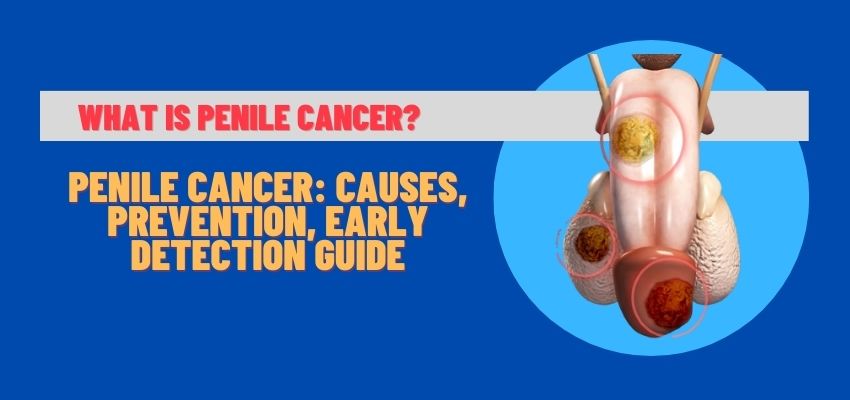It is estimated to affect less than 1% of men in their lifetime. Penile Cancer is a rare form of cancer that affects the penis, a part of the male reproductive system. Despite its low incidence, penile cancer is a serious condition that can have a significant impact on a man’s physical and emotional health. Early detection is critical for successful treatment and a favorable outcome. In this blog, we will explore the causes, symptoms, diagnosis, treatment, and prevention of penile cancer, providing you with the information you need to stay informed and stay healthy.
What is Penile Cancer?
Penile cancer is a type of cancer that affects the penis, the male reproductive organ responsible for urine and semen excretion. Penile cancer is a rare condition, but it is still important to understand its causes, symptoms, and treatment options.
The penis is composed of several parts, including the shaft, the head (glans), and the foreskin (prepuce). Penile cancer can develop in any of these parts of the penis, but it most commonly occurs in the foreskin or the head of the penis.
Penile cancer starts when cells in the penis grow and divide uncontrollably, forming a mass or tumor. There are several different types of penile cancer, including squamous cell carcinoma, basal cell carcinoma, melanoma, and sarcoma.
It is important to note that penile cancer is a slow-growing condition, and it may take several years for symptoms to develop. Some of the most common symptoms include changes in the skin of the penis, such as thickening, redness, or scaling, as well as lumps or growths on the penis. Other symptoms may include discharge or bleeding from the penis, pain or discomfort during sexual activity, and changes in the shape or curvature of the penis.
Treatment for penile cancer may include surgery, radiation therapy, chemotherapy, or a combination of these methods. The choice of treatment will depend on the stage and type of cancer, as well as the ‘s overall Men Health. In some cases, immunotherapy or participation in a clinical trial may also be options.
Understanding the causes, symptoms, and treatment options can help you stay informed and prepared, and can also increase your chances of successful treatment and recovery. If you have any concerns about penile cancer, it is important to talk to a doctor as soon as possible.
What are the Main Penile Cancer Causes?
The exact cause of penile cancer is not known, but several risk factors have been identified that may increase a man’s chance of developing the condition. Some of the most common risk factors include:
- Age: The risk of penile cancer increases with age, with most cases occurring in men over the age of 50.
- Human Papillomavirus (HPV): HPV is a common sexually transmitted infection that has been linked to the development of penile cancer.
- Circumcision: Men who have not been circumcised are at a higher risk of developing penile cancer, particularly in countries where circumcision is not a common practice.
- Smoking: Smoking is a well-established risk factor for many types of cancer, including penile cancer.
- Phimosis: Phimosis is a condition in which the foreskin of the penis cannot be retracted, which can lead to a buildup of secretions and increase the risk of infection and cancer.
- Poor hygiene: Poor hygiene practices, such as not washing the penis regularly, can increase the risk of infection and cancer.
It is important to note that having one or more of these risk factors does not guarantee that a man will develop penile cancer. Many men with these risk factors never develop the condition, and some men who develop penile cancer have no known risk factors. However, understanding these risk factors can help you make informed decisions about your health and can also increase your chances of early detection and successful treatment if the condition does develop.
Importance of early detection and treatment of Penile Cancer
Early detection and treatment of penile cancer are critical for the best possible outcome and for reducing the risk of serious complications. Here are a few reasons why early detection and treatment are so important:
- Improved chances of successful treatment: The earlier penile cancer is detected, the smaller the tumor is likely to be and the less likely it is to have spread to other parts of the body. This can increase the chances of successful treatment and a favorable outcome.
- Reduced risk of serious complications: If penile cancer is detected and treated early, the risk of serious complications, such as the spread of cancer to other parts of the body, is significantly reduced.
- Better quality of life: Penile cancer can have a significant impact on a man’s physical and emotional health, including sexual function. Early detection and treatment can help preserve the quality of life and reduce the condition’s impact.
- Increased treatment options: The earlier penile cancer is detected, the more treatment options are likely to be available. For example, surgery may be an option for early-stage tumors, but radiation or chemotherapy may be necessary for more advanced cases.
- Peace of mind: Early detection and treatment of penile cancer can bring peace of mind and reduce the stress and anxiety associated with a cancer diagnosis.
If you have any concerns about penile cancer, it is important to see a doctor as soon as possible. They can perform a physical exam and order diagnostic tests to determine the presence and extent of cancer. With prompt and appropriate treatment, many men are able to successfully manage this condition and maintain a good quality of life.
What are the Penile Cancer Symptoms?
Recognizing the symptoms of penile cancer is important for early detection and prompt treatment. Some common symptoms of penile cancer include:
- Lesions or sores: One of the most common symptoms of penile cancer is the presence of lesions or sores on the penis. These may be painful or painless and may appear as flat or raised growths on the skin of the penis.
- Change in color: A change in the color of the skin on the penis can be a symptom of penile cancer. The skin may become darker or discolored or may develop patches of red or white.
- Thickening or swelling: Penile cancer can cause thickening or swelling of the skin on the penis, which may be accompanied by pain or discomfort.
- Discharge: Discharge from the penis can be a symptom of penile cancer, particularly if the discharge is thick, white, or has a foul odor.
- Lumps: Lumps or masses on the penis can be a symptom of penile cancer. These may be felt as hard or soft lumps under the skin and may be accompanied by pain or discomfort.
- Bleeding: Bleeding from the penis can be a symptom of penile cancer, particularly if it occurs without explanation and is not related to a sexual injury.
It is important to note that these symptoms can also be caused by other conditions, such as infections or skin conditions. However, if you experience any of these symptoms, it is important to see a doctor for a thorough evaluation.
What is the Diagnosis of Penile Cancer
Diagnosing penile cancer requires a comprehensive evaluation by a healthcare professional. Here are some of the common diagnostic tests used to diagnose penile cancer:
- Physical examination: A physical examination of the penis is the first step in diagnosing penile cancer. During the exam, the doctor will inspect the skin of the penis for any signs of lesions or abnormal growth.
- Biopsy: A biopsy is a procedure in which a small sample of tissue is removed from the penis and examined under a microscope. This test is used to determine if the tissue is cancerous and, if so, what type of cancer it is.
- Imaging tests: Imaging tests, such as X-rays, CT scans, or MRI, may be ordered to determine the extent of cancer and to check for the spread of cancer to other parts of the body.
- Blood tests: Blood tests may be ordered to check for markers of cancer and to evaluate the overall health of the patient.
- Urine tests: Urine tests may be ordered to check for markers of cancer and to evaluate the overall health of the patient.
If the results of these tests indicate that a man has penile cancer, the doctor will determine the stage of cancer and recommend a course of treatment. The stage of the cancer is a measure of how advanced the cancer is and helps determine the best course of treatment.
Treatment Options for Penile Cancer
The treatment options for penile cancer depend on the stage of cancer, the patient’s overall health, and other factors. Here are some of the common treatment options for penile cancer:
- Surgery: Surgery is often the primary treatment for penile cancer, particularly for early-stage cancers. The type of surgery performed will depend on the stage and location of cancer but may include partial or complete removal of the penis (penectomy), removal of the cancerous tissue and some surrounding healthy tissue (wide local excision), or removal of the entire penis and surrounding lymph nodes (radical penectomy).
- Radiation therapy: This treatment may be used alone or in combination with surgery, particularly for larger or more advanced cancers.
- Chemotherapy: Chemotherapy uses drugs to kill cancer cells and may be used alone or in combination with radiation therapy for larger or more advanced cancers.
- Immunotherapy: Immunotherapy is a type of treatment that helps the body’s own immune system fight cancer. This type of treatment is still in the experimental stages for penile cancer and is not widely used.
- Cryotherapy: Cryotherapy involves the use of extreme cold to freeze and destroy cancer cells. This treatment is sometimes used for early-stage cancers that are small and have not spread to surrounding tissue.
The treatment plan for penile cancer will depend on the individual patient and the stage and characteristics of cancer. It is important to work closely with a healthcare professional to determine the best course of treatment for your specific needs and to discuss the potential benefits and risks of each option.
Prevention of Penile Cancer
Preventing penile cancer is not always possible, but there are steps you can take to reduce your risk. Here are some steps you can take to help prevent penile cancer:
- Practice good hygiene: Keeping the penis clean and dry can help reduce the risk of infection and other conditions that can increase the risk of penile cancer.
- Avoid sexually transmitted infections (STIs): STIs, such as human papillomavirus (HPV), are a known risk factor for penile cancer. Practicing safe sex and using condoms can help reduce the risk of STIs and penile cancer.
- Quit smoking: Smoking is a known risk factor for many types of cancer, including penile cancer. Quitting smoking can help reduce the risk of penile cancer and many other health problems.
- Practice sun safety: Prolonged exposure to the sun can increase the risk of skin cancer, including penile cancer. Wearing protective clothing and using sunblock can help reduce the risk of skin cancer and other health problems related to sun exposure.
- Manage chronic conditions: Chronic conditions, such as phimosis or balanitis, can increase the risk of penile cancer. Taking steps to manage these conditions and seeking prompt treatment for any symptoms can help reduce the risk of penile cancer.
- Get vaccinated: The HPV vaccine is available to protect against certain types of HPV that are known to increase the risk of penile cancer. Getting vaccinated can help reduce the risk of penile cancer and other health problems related to HPV.
- Practice regular self-examination: Regular self-examination can help you become familiar with the normal appearance of your penis and to identify any changes that may indicate the presence of penile cancer. If you notice any changes, it is important to see a doctor promptly for evaluation.
It is important to remember that penile cancer is rare, and the majority of men will never develop the condition. However, taking steps to reduce your risk and practicing regular self-examination can help you detect any changes or problems early when they are most treatable.
Conclusion of Penile Cancer
In Conclusion, penile cancer is a rare but serious condition that requires prompt diagnosis and treatment. By understanding the causes, risk factors, and symptoms, you can take steps to reduce your risk and seek prompt care if necessary. Regular self-examination, good hygiene, quitting smoking, reducing sun exposure, managing chronic conditions, and getting vaccinated are all important in the prevention of penile cancer.
To our readers, we encourage you to educate yourself on the signs and symptoms of penile cancer and to seek prompt care if you experience any changes or concerns. Early detection is key to achieving the best possible outcome, so don’t hesitate to reach out to your doctor if you have any questions or concerns. Together, we can work towards a future where all cases of penile cancer are caught early and treated effectively.


